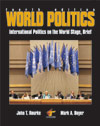Corruption and International Law The growing global movement against corruption is one way to see the sources and evolution of positivist international law. The growth of economic interdependence has made corruption increasingly intolerable to those doing business across international borders. International financial agencies such as the World Bank are also critical of corruption because it hinders development (Elliot, 1997). At the heart of the movement against corruption is a relatively new international nongovernmental organization (NGO) called Transparency International (TI). It was founded in 1993, has its headquarters in Berlin, Germany, has national chapters in 78 countries, and is financed in the main by governmental agencies (like the U.S. Agency for International Development, USAID), and by corporations (such as General Electric). The Advisory Council of TI includes such luminaries as former president of Costa Rica and Nobel Peace Prize laureate Oscar Arias Snchez and former U.S. president Jimmy Carter. According to its Web page (http://www.transparency.de/index.html), TI "is a non-governmental organisation dedicated to increasing accountability and curbing both international and national corruption programs." Perhaps TI's most effective public relations tool is the annual Corruption Perception Index that it began publishing in 1994. According to TI chairman, Peter Eigen, a former World Bank official, the index measures "how business people around the globe perceive levels of corruption." 1 The results of the 1999 index, which scored 99 countries from 0 (most corrupt) to 10 (least corrupt), found Cameroon (1.5) the world's most corrupt country. Being labeled one of the world's most corrupt places brings responses ranging from outrage to a kind of grim humor. After the 1997 survey, which ranked Nigeria and Pakistan the most corrupt and second most corrupt countries, one Pakistani quipped, "Actually we were number 1, but we bribed the Nigerians to take first place."2 Denmark finished best in 1999 with a perfect 10. The United States (7.5) came in eighteenth. TI has been able to move the issue of corruption onto the international political and legal agenda. For example, the Organization for Economic Cooperation and Development (OECD), which includes the world's economically developed countries (EDCs) and a number of other countries, adopted in 1997 the Convention on Combating Bribery of Foreign Public Officials in International Business Transactions. The 21 countries that have ratified the treaty so far agree to a number of steps, such as passing national laws to, among other things, end the ability to take tax deductions for bribes paid in international business transactions. There is also now a periodic International Anti-Corruption Conference. The 1999 meeting, which was held in Durban, South Africa, drew over 1,600 delegates from 135 countries and the 2001 meeting is scheduled to convene in Prague, Czech Republic. It is too early to predict exactly the degree to which corrupt practices will become the subject of international law, but the activities of TI are arguably part of the genesis of turning what not long ago was an exclusive concern of national law into a matter of international law. Notes 1. New York Times, August 13, 1997, p. A3. 2. Hartford Courant, September 21, 1997, p. D1. |



 2002 McGraw-Hill Higher Education
2002 McGraw-Hill Higher Education